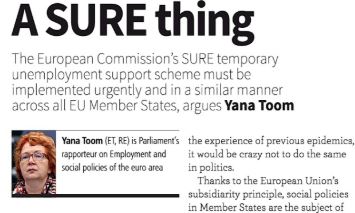
MEP Yana Toom (Renew Europe) has published an opinion about the SURE (Support to mitigate Unemployment Risks in an Emergency) scheme proposed by European Commission in The Parliament Magazine.
I had to check the data several times while writing this article, yet when it will be published the numbers will already be inaccurate – the situation in the European labour market changes every day. Actually the right word would be “worsens” and no one knows how long it will take. The crisis we are witnessing now is no more predictable than the virus that caused it. But if in treating COVID-19 our doctors are successfully relying on the experience of previous epidemics, it would be crazy not to do the same in politics.
Thanks to the European Union’s subsidiarity principle, social policies in Member States are the subject of national competence. This means that the only instruments the EU has are country specific recommendations - which although make interesting reading material, their implementation rate is extremely poor - and the exchange of best practices. And some of these practices from preceding crises are worth considering.
For example, the implementation of a comprehensive European unemployment insurance scheme is new, but we know that at the national level it was used in Germany during the previous economic turmoil. OECD research shows that in Germany the massive use of the Kurzarbeit scheme in the aftermath of the 2008 economic crisis significantly cushioned the impact of the economic downturn on the country’s unemployment rate: “With more than 1.4 million workers participating in the scheme and with an average reduction in working hours by one third, current unemployment is close to half a million lower than it would be without the scheme. This corresponds to more than one percent of the labour force.” Of course, this was only one measure out of many, including a fiscal stimulus package, temporary lowering of social insurance contributions and expansion of subsidies for vocational training for some categories of workers. Still the German recovery is lauded in the textbooks as a “labour market miracle in the Great recession”.
In my home country, Estonia, we also had some miracles, but not in the labour market. It’s difficult to draw a clear parallel with Estonia during the same period for a number of reasons, starting with different principles around the registration of the unemployed, labour market structure and the impact of the downturn on unemployment. But the fact remains: Estonia applied a different approach and promptly implemented changes in its Employment Contracts Act, essentially letting employers get rid of workers with fewer restrictions than previously allowed.
This decision was consistent with the general austerity measures allegedly taken to save the Estonian economy. However, as a consequence those in employment decreased from 650,000 at the end of 2008 to 550,000 at the beginning of 2010. If we had taken a course similar to Germany’s, tens of thousands of jobs might have been saved. Moreover, the Estonian labour market and economy would have been restored much faster.
Just a few weeks ago at the end of March, the European Trade Union Confederation (ETUC) claimed that “at least one million people have lost their jobs during the past two weeks”. More recently on 7 April the ETUC estimated that unemployment had risen by at least four million since the Coronavirus crisis began, while more than seven million workers had been placed on short-time work schemes. Two days later the ETUC said that “with 15 million jobs already affected by the lockdown, workers and companies cannot wait longer”.
We see increasing pressure and we must act accordingly. That is why I warmly welcome the European Commission’s instrument for temporary Support to mitigate Unemployment Risks in an Emergency (SURE). The SURE scheme is temporary and complimentary to national unemployment insurance schemes, but it will give the opportunity to preserve jobs, as well as support the purchasing power of citizens. If it works, we will have a functioning solution for critical times and, more importantly – we will make a step towards real unity. For we can talk about common market, mobility and freedom of movement, but without real solidarity it will be hard to convince unemployed citizens that European project is worth to be the part of.
The economic benefits of short time working schemes are transparent and self-evident. The less the economy is damaged, the sooner it can recover; the less general demand is harmed, the sooner businesses are resuscitated, and vice versa. However, although such schemes are necessary, they are far from sufficient. The problem with SURE is that it is not a country-wide instrument but a Europe-wide one, suffering from typical Brussels tardiness. Also implementation at national level is delegated to the national governments, which could be a problem. Certain promotion seems necessary, as well as detailed elaboration of the European Commission guidelines.
However, SURE is surely a good thing, but it needs to be implemented urgently and in a similar manner in all EU countries. If this is not the case, we risk losing another opportunity to shorten the time of our recovery.